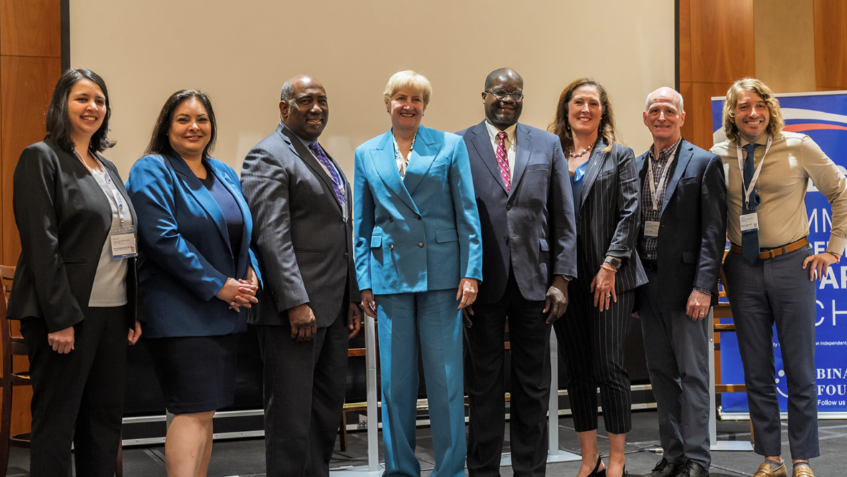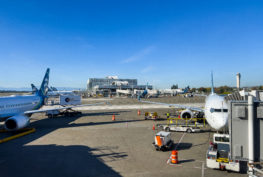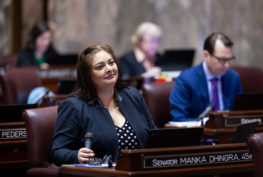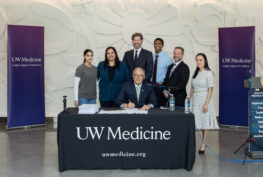SEATTLE — A panel of national health care leaders at the Binaytara Foundation’s annual Summit on Cancer Health Disparities discussed Washington’s role leading the nation in expanding health care coverage on the way to universal health care.
“Each and every person in our society deserves high quality health care, regardless of their ability to pay,” said Sen. Manka Dhingra (D-Redmond), who participated in the panel discussion. “Health care is a right, not a privilege. No one should have to become homeless or declare bankruptcy due to medical debt. That’s why we need to build a system that covers everyone.”
The panel — “Is Universal Health Care a Solution to U.S. Health Care Disparities?” — focused on how universal health care could address the disparities in care endemic to the current U.S. health care system.
Washington has made significant progress expanding coverage in the last decade, said Dhingra, by building the Washington Health Benefit Exchange, expanding Apple Care, increasing state subsidies, and extending coverage to people regardless of their immigration status. Those steps have brought down Washington state’s uninsured rate to 4.7% — the lowest it has ever been. But hundreds of thousands of Washingtonians still do not have health care coverage.
“The next step is to make health care access truly universal,” Dhingra said.
Moderated by Manisha Bhattacharya, MD, MBA and Aaron Goodman, MD, the panel also included participation by Karen E. Knudsen, MBA, PhD (CEO of the American Cancer Society); Barbara L. McAneny, MD (Past-President of the American Medical Association); Willie Underwood, III, MD, MSc, MPH (Chair of the AMA Board of Trustees); Rep. Adam Smith (Representative for Washington’s 9th Congressional District); and Isaac Opole, MD, MBChB, PhD, FACP (President of the American College of Physicians).
Washington’s work to expand coverage
In 2013, the uninsured rate in Washington state was 14%. By 2022 that had decreased to 4.7%. The first step was Washington’s successful implementation of the Affordable Care Act, which expanded coverage through Apple Health (Medicaid) and through the Washington Health Benefit Exchange.
Then in 2019, the Legislature passed Cascade Care, the nation’s first public option for health care coverage. Cascade Care also established a popular set of plans with standardized benefit packages that make it easy for customers to compare benefits and prices across plans.
More than 33,000 Washingtonians chose a Cascade Care standard plan for 2021, the first year they were offered, saving as much as $1,000 in out-of-pocket costs.
In 2021, the Legislature established a premium subsidy program for Washingtonians with incomes below 250% of the federal poverty level.
Those subsidies, together with federal tax credits, meant that more than 100,000 Washingtonians were eligible for Cascade Care plans that cost no more than $10 per month for a gold or silver plan, and some were able to get coverage at no cost.
In 2024, undocumented immigrants were able to purchase health insurance on Washington Healthplanfinder, for coverage starting in January. The Legislature also funded a subsidy program for adults earning less than 138% of the federal poverty level, regardless of immigration status, which is slated to begin July 1.
Reining in prescription drug prices
The Legislature has taken steps to keep prescription drug prices down. In 2014, the Legislature passed an All Payer Claims Database to track prescription drug prices and followed up with strong transparency legislation in subsequent years. In 2022, the Legislature established a Prescription Drug Affordability Board to help reign in the most egregious prices. It will begin conducting affordability reviews and setting upper payment limits on excessively priced drugs in 2027.
The Legislature has also taken direct action in cases where life-saving drugs that were invented many years ago saw their prices skyrocket. In 2021, the Legislature passed a bill (SB 5203) to enable the state to partner with manufacturers or other states to produce our own generic drugs, or to simply purchase drugs from a state like California, which is standing up a production program.
In the meantime, the Legislature has capped the out-of-pocket cost to consumers of insulin at $35 per month (SB 5729), and has taken similar steps for asthma medication and epinephrine, capping out-of-pocket costs to patients of inhalers at $35 per month and EpiPens at $35 per two-pack (HB 1979).
Washington’s path to universal health care
At the same time, the Legislature has been preparing for universal health care in Washington.
In 2019, the Legislature established the Universal Health Care Work Group, which studied the issue and laid out potential paths the state could take to achieving universal coverage, including a single-payer system.
And in 2021, the Legislature established the Universal Health Care Commission, which is working to implement immediate and impactful changes in the state’s current health care system to increase access to quality, affordable health care.




